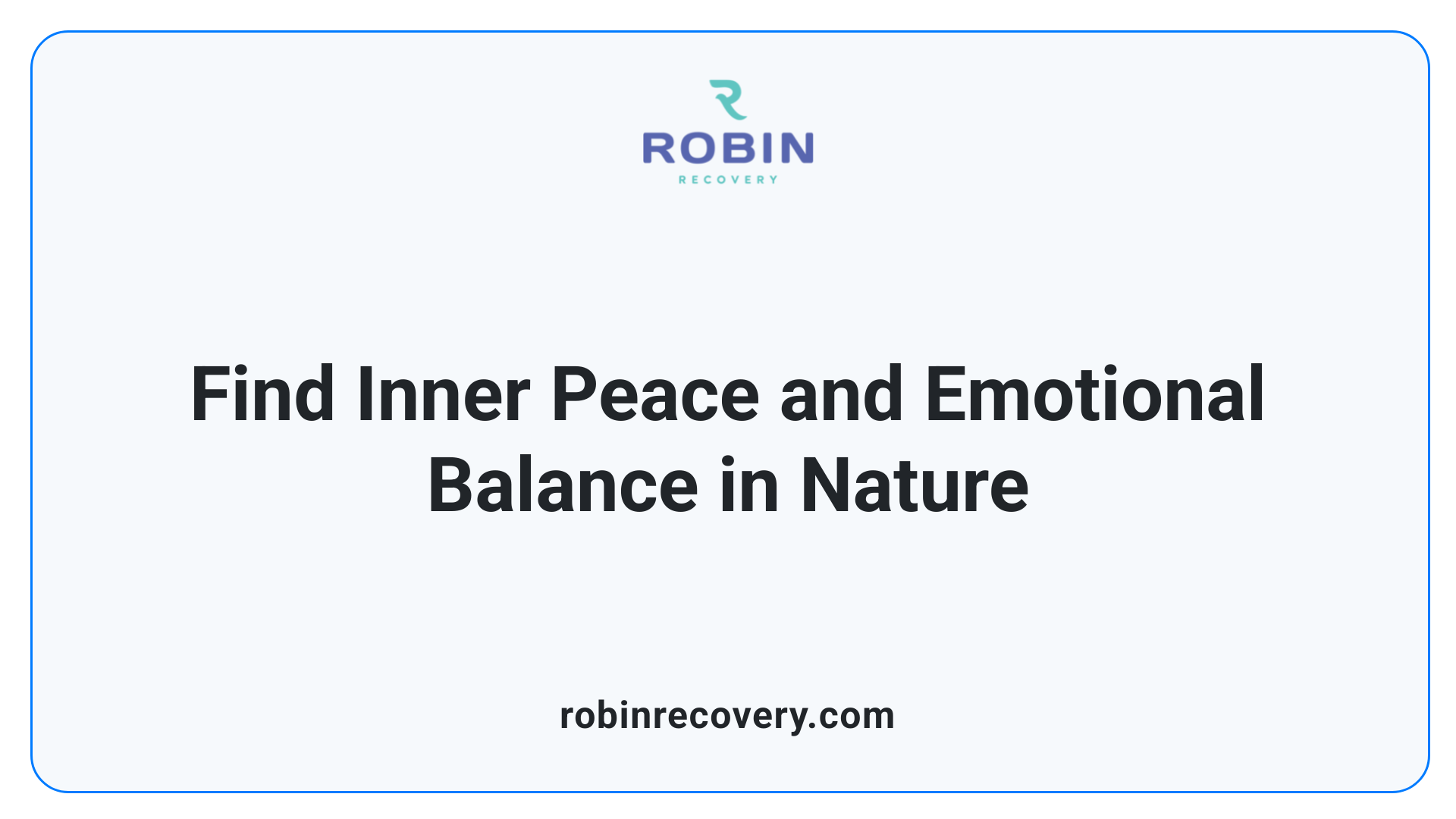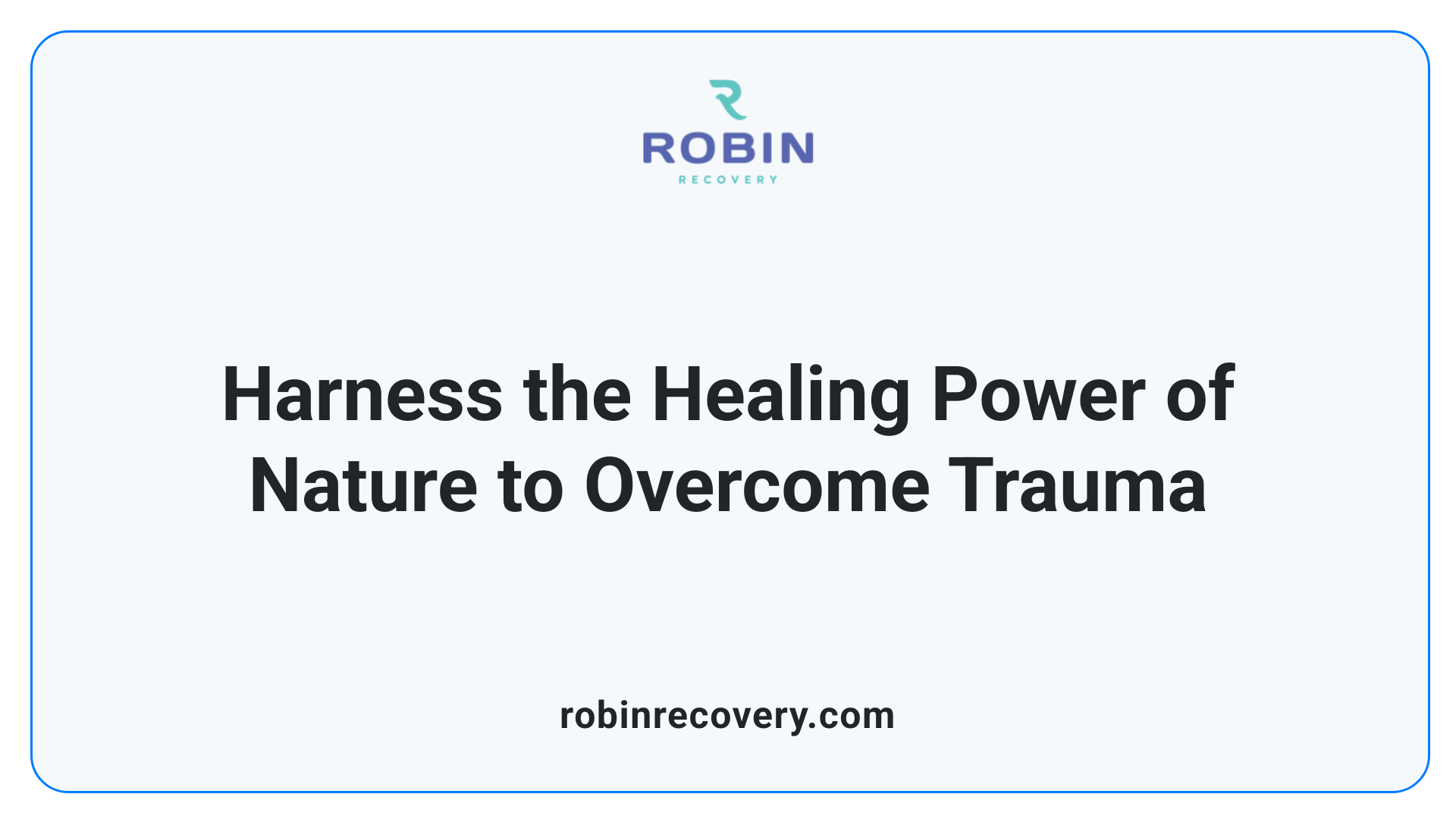The benefits of exploring nature and outdoor activities in recovery

Discover how outdoor activities facilitate sustainable healing and personal growth.
Exploring nature offers a profound and multifaceted approach to recovery from addiction and personal struggles. From physical health benefits to mental and emotional resilience, outdoor activities serve as powerful tools that nurture well-being, foster community, and promote spiritual renewal. This article explores the diverse advantages of integrating nature into recovery processes, highlighting evidence-based insights and practical applications.
Enhancing Physical Health Through Nature-Based Activities

What are the cardiovascular benefits of outdoor activities like hiking, cycling, and swimming?
Outdoor activities such as hiking, cycling, and swimming are excellent for boosting heart health. These exercises promote improved cardiovascular function by increasing heart rate and circulation, which helps strengthen the heart muscle. Regular engagement in these activities can reduce the risk of heart disease and improve overall heart efficiency.
How do outdoor activities improve muscle strength, flexibility, and stamina?
Participating in activities like rock climbing, outdoor yoga, or trekking challenges muscles, increasing strength and endurance. These movements often involve dynamic motions that enhance flexibility and promote better muscle tone. Over time, consistent outdoor exercise leads to increased stamina, making daily tasks easier and improving overall physical resilience.
How does outdoor activity contribute to better sleep and reduce chronic disease risk?
Exposure to natural environments helps regulate circadian rhythms, which improves sleep quality. Better sleep supports physical recovery and mental health. Moreover, physical activity outdoors can lower the risk of chronic illnesses such as type 2 diabetes and certain cancers by managing weight, improving blood sugar levels, and promoting healthy blood pressure.
Why is environment important for recovery?
The environment significantly influences the healing process by fostering emotional well-being and providing necessary support. Natural surroundings calm the mind, decrease stress and fatigue, and create a safe space for emotional processing. Supportive settings, including family, peer groups, and organized outdoor programs, cultivate accountability, reduce triggers, and help maintain sobriety. When individuals are immersed in positive, stress-free environments, they are more likely to develop sustainable habits that support long-term recovery.
Activity Type Physical Benefits Additional Notes Hiking Cardiovascular health, muscle tone Connects with nature, stress reduction Cycling Endurance, joint health Enhances stamina, promotes weight management Swimming Total body workout, low impact Improves flexibility and lung capacity Outdoor Yoga Flexibility, mental clarity Fosters mindfulness, reduces anxiety Gardening Muscle strength, mood boost Connects with nature, therapy component
Spending at least two hours weekly in green or blue spaces can significantly improve physical and mental health, reinforcing recovery efforts. These activities not only bolster the body but also foster a sense of achievement and community, essential for ongoing sobriety.
Mental and Emotional Well-being in Natural Settings

How does exposure to natural environments reduce stress and anxiety?
Engaging in outdoor activities like walking, hiking, or kayaking can quickly lower stress levels, making it easier for individuals in recovery to ground themselves. Natural environments have a calming effect, attributed to the soothing presence of green spaces and the opportunity for physical activity. Research highlights that time spent outdoors helps decrease muscle tension, lower blood pressure, and reduce stress hormones such as cortisol.
In what ways do outdoor activities boost mood and influence neurotransmitter activity?
Outdoor pursuits stimulate the release of neurotransmitters like serotonin and dopamine, which are crucial for mood regulation. Activities such as outdoor yoga, cycling, and hiking increase endorphin levels, creating a natural mood lift. Exposure to sunlight during these activities also raises vitamin D levels, essential for mental health and combating depression. These combined effects promote emotional harmony and resilience during recovery.
How can natural environments improve cognitive functions?
Time in nature has been linked to enhanced cognitive abilities, including better attention, working memory, and cognitive flexibility. Listening to natural sounds or viewing videos of natural scenery can further boost mental clarity and emotional well-being. Studies demonstrate that spending just two hours weekly in green or blue spaces can improve overall cognitive performance, helping individuals manage their recovery more effectively.
In what ways does nature foster self-awareness and mindfulness?
Outdoor activities encourage mindfulness by promoting present-moment awareness. Activities like outdoor meditation, yoga, or simple walks in nature help individuals focus on their surroundings, cultivate gratitude, and develop a deeper understanding of themselves. This heightened self-awareness can strengthen emotional regulation, reduce anxiety, and improve mental health.
How does spending time outdoors help reduce symptoms of depression?
Being in natural environments increases the production of mood-enhancing chemicals such as endorphins, serotonin, and dopamine. It also helps regulate circadian rhythms, leading to better sleep patterns, which are often disrupted during recovery. Additionally, the sense of awe and spiritual connection experienced outdoors can provide comfort, reduce feelings of loneliness, and lower the risk of depression, supporting long-term mental health stability.
Aspect of Mental Well-being Benefits Supporting Activities Stress and Anxiety Reduction Lower cortisol, muscle tension, blood pressure Walking, kayaking, outdoor yoga Mood Enhancement Increased serotonin, dopamine, endorphins Hiking, cycling, nature viewing Cognitive Function Boost Improved memory and focus Nature listening, green space visits Mindfulness and Self-awareness Greater present-moment focus Meditation, mindful walks Depression Symptoms Better sleep, elevated mood Spending regular time outdoors, sunlight exposure
Connecting with nature not only provides immediate emotional relief but also promotes long-term mental health benefits. Whether through green spaces, blue environments, or remote biodiverse areas, immersing oneself in natural settings can foster resilience, reduce emotional triggers, and support a sustained recovery journey.
Natural Environment and Trauma Healing

What is the importance of environment in recovery?
The environment is a fundamental aspect of healing, especially for individuals recovering from trauma. Natural settings, such as parks, forests, and aquatic environments, offer a calming backdrop that reduces stress and emotional distress. These environments help minimize triggers that might lead to relapse or emotional setbacks.
Supportive settings—whether through family, peer groups, or safe recovery centers like Delamere—foster accountability and a sense of safety. Being in nature or organized outdoor spaces encourages emotional regulation, promotes mindfulness, and helps individuals process trauma more effectively.
Natural environments also assist in reducing mental fatigue and emotional triggers by providing a peaceful space for reflection. Social interactions within these settings, especially with sober peers, strengthen support networks and promote healthier habits.
Addressing underlying issues like adverse childhood experiences and family dynamics becomes easier in a positive, stress-free environment. These settings create a foundation where individuals can rebuild resilience and develop coping strategies.
In summary, a stable, supportive, and calming environment—enhanced by access to natural surroundings—plays a vital role in maintaining long-term recovery and emotional well-being.
How does forest bathing contribute to calming the mind?
Forest bathing, or Shinrin-yoku, involves immersing oneself in a natural wooded environment. Research indicates that this practice can significantly lower cortisol levels—the hormone associated with stress—and reduce anxiety.
Spending time in forests encourages relaxation through sensory engagement—listening to natural sounds, observing greenery, and breathing in clean air. This immersion helps slow the heart rate, lower blood pressure, and promote a sense of tranquility.
The calming effects of forest bathing support trauma recovery by quieting overactive mental processes, reducing hyperarousal, and fostering a sense of peace. Regular exposure to such environments can strengthen emotional resilience and improve overall mood.
How do grounding techniques and outdoor activities produce immediate calming effects?
Grounding techniques, often practiced outdoors, involve engaging the senses with the natural environment to anchor individuals in the present moment. Methods include walking barefoot on grass, touching leaves, or focusing on natural sounds.
These activities trigger the body's relaxation response by reducing muscle tension, lowering blood pressure, and decreasing stress hormones like cortisol. Immediate calming effects help individuals manage anxiety and emotional overwhelm.
Outdoor activities—such as walking, hiking, or simple outdoor meditation—amplify this effect by encouraging physical movement, mindfulness, and connection with nature. These practices support trauma survivors in grounding themselves during moments of emotional distress.
Why is connection to nature beneficial in trauma recovery?
Building a connection to nature offers emotional and spiritual benefits that can significantly aid trauma healing. Nature evokes feelings of awe and wonder, which can shift focus from trauma-related ruminations to feelings of gratitude and perspective.
Regular engagement with natural surroundings fosters a sense of belonging to something larger than oneself, promoting self-efficacy and purpose. This sense of connection can mitigate loneliness and social isolation, common issues in trauma recovery.
Studies show that feeling connected to nature independently correlates with higher happiness, improved mood, and reduced symptoms of depression and anxiety. For trauma survivors, these benefits improve emotional regulation and resilience.
Moreover, activities like outdoor yoga, hiking, or simply sitting in green spaces enhance mindfulness and help build new, positive routines essential for sustained recovery.
Impact Area Benefits Additional Notes Stress reduction Lowers cortisol, blood pressure Forest bathing, grounding techniques Emotional well-being Enhances mood, reduces depression Nature sounds, views of green spaces Social support Builds community, reduces loneliness Group outdoor activities Cognitive function Improves attention and memory Green space exposure near schools or homes Physical health Boosts fitness, vitamin D levels Hiking, cycling, outdoor sports Overall resilience Fosters hope, purpose, self-confidence Wilderness therapy, adventure activities
Engaging with the natural environment is not just about physical activity but also about nurturing the mind and spirit. For those on a path of trauma healing, nature provides a sanctuary for recovery, reflection, and renewal.
Fostering Social Connection and Community Support Outdoors

Why is building a supportive recovery community important?
A strong social network is fundamental to successful recovery. Engaging in outdoor activities offers opportunities to connect with others who share similar goals, creating a sense of belonging and mutual support. These connections can help individuals stay motivated, accountable, and emotionally grounded.
How do group activities like hiking, outdoor yoga, and picnics support recovery?
Participating in group outdoor activities fosters camaraderie, encourages active engagement, and builds trust among participants. Activities like hiking, outdoor yoga, and picnics allow individuals to relax, share experiences, and develop new social skills in a natural setting. These experiences help break down feelings of isolation and loneliness while promoting positive social interactions.
How does spending time outdoors reduce loneliness and boredom — common relapse triggers?
Loneliness and boredom are significant risk factors for relapse. Outdoor activities provide meaningful hobbies and daily routines that keep individuals engaged. Being in nature not only alleviates feelings of loneliness but also instills a sense of purpose and achievement, which are crucial for maintaining sobriety.
Why is sharing experiences in outdoor settings beneficial?
Sharing outdoor adventures can strengthen bonds, foster empathy, and improve communication. These shared experiences develop trust and social support networks, which are invaluable during recovery. Additionally, learning new skills in the outdoors, such as navigation or survival techniques, boosts confidence and self-esteem.
Aspect Benefits Examples Community Building Enhances social support, accountability, belonging Group hikes, outdoor classes Emotional Well-being Reduces stress, promotes trust Picnics, team sports Skill Development Fosters self-efficacy, resilience Wilderness challenges, outdoor workshops Trigger Management Helps manage negative emotions Guided outdoor mindfulness, nature walks
The environment's role in recovery
The environment plays a critical role in recovery by offering emotional safety, minimizing triggers, and facilitating supportive interactions. Natural spaces like parks, forests, and organized outdoor programs provide calming settings that reduce stress and mental fatigue. These environments encourage mindfulness, foster social connections, and support emotional regulation.
Creating a stable, stress-free environment—whether physical or social—is essential. Interaction with sober peers in natural settings nurtures accountability and provides a buffer against triggers related to trauma or substance cues. Overall, outdoor activities are powerful tools in building resilient recovery communities that thrive on shared experiences, support, and a connection to nature.
Integrating Nature Into Recovery Programs and Resources
What is the importance of environment in recovery?
The environment significantly influences the recovery process by shaping emotional health, offering vital support, and reducing the likelihood of relapse. Supportive surroundings, including family, peer networks, and safe rehabilitation centers like Delamere, foster accountability and a sense of emotional safety. These settings create a foundation where individuals can process trauma, develop trust, and maintain sobriety.
Natural environments and organized outdoor activities are particularly effective in reducing stress, mental fatigue, and emotional triggers. Being in green or blue spaces—such as parks, forests, lakes, or rivers—has been shown to relax the mind and body, helping individuals manage cravings and negative emotions.
Social environments consisting of sober peers promote healthier habits and diminish exposure to substance use cues. These supportive groups help reinforce coping strategies learned during therapy while offering companionship and encouragement.
Addressing adverse childhood experiences and complex family dynamics within positive environments can prevent emotional setbacks that often lead to relapse. Integrating outdoor activities into recovery can serve as a powerful tool to build resilience, foster connection, and sustain long-term sobriety.
Overall, creating a stable, stress-free environment that includes natural settings and outdoor pursuits is essential for a successful recovery journey, enabling individuals to reconnect with themselves and the world around them.
The Long-Term Benefits of Nature Exposure in Recovery

What is the importance of environment in recovery?
The environment plays a vital role in supporting long-term recovery from addiction. A natural setting can significantly influence emotional health, providing a calming backdrop that helps reduce stress, anxiety, and mental fatigue. Supportive environments—including family, peer groups, and safe outdoor spaces—foster accountability and emotional safety.
Locations like Delamere serve as examples of retreat-like settings that promote healing and resilience. Incorporating nature into recovery routines helps diminish emotional triggers that could lead to relapse. When individuals are in natural environments, they often experience a decrease in cortisol levels—the stress hormone—leading to calmer moods and enhanced mental clarity.
Social environments, particularly those involving sober peers and community activities in nature, further bolster health by reinforcing positive habits and offering vital support networks. Addressing past adverse experiences, such as childhood trauma or dysfunctional family dynamics, within a stable, nature-infused environment is crucial for preventing setbacks.
Creating a balanced and stress-free environment—whether through outdoor activities, community involvement, or peaceful natural spaces—lays a solid foundation for maintaining sobriety and emotional well-being over the long term.
How do outdoor activities support sustained mental health?
Engaging regularly in outdoor pursuits like hiking, cycling, or kayaking has lasting mental health benefits. These activities boost the production of neurotransmitters like serotonin and dopamine, which help improve mood and regulate emotions. Consistent exposure to nature reduces the risk of depression and enhances overall psychological resilience.
Spending time outdoors also fosters mindfulness and presence, encouraging individuals to focus on the present moment while cultivating gratitude. This mental clarity can be transformative during recovery, helping to manage cravings and preventing relapse.
Activities rooted in nature, such as gardening or outdoor yoga, support cognitive function, memory, and attention skills that are often impaired by substance use. They also promote physical health, boosting energy levels and sleep quality, which are essential for long-term recovery.
Building new, healthy routines through outdoor engagement
Establishing routines that incorporate outdoor activities helps in creating sustainable habits. Regular participation in activities like walking, outdoor sports, or outdoor arts can instill a sense of purpose, achievement, and normalcy.
These routines often serve as healthy replacements for old triggers linked to substance use. They also open avenues for social connection, helping to rebuild trust and community bonds that are integral to emotional healing.
How do outdoor activities enhance self-esteem and resilience?
Outdoor challenges—such as climbing, trekking, and survival skill courses—teach vital life skills, boosting self-directed confidence and resilience. Facing and overcoming natural obstacles fosters a sense of accomplishment and self-efficacy.
These experiences also strengthen emotional resilience by teaching individuals to navigate stress and setbacks in a controlled, supportive environment. Building such confidence is instrumental in rewiring trauma-related feelings of helplessness.
Vitamin D production and immune support through nature
Sunlight exposure during outdoor activities stimulates vitamin D synthesis, which is vital for immune function and mood regulation. Higher vitamin D levels are linked to lower depression symptoms, better sleep, and enhanced immunity—factors that support long-term health in recovery.
Reducing relapse risks with outdoor engagement
Regular outdoor activity helps manage triggers and cope with stressors that might otherwise lead to relapse. The natural environment provides a grounding experience, reducing cravings and negative thoughts.
Moreover, activities that involve social interaction foster a sense of belonging and support, which are critical components in sustaining sobriety. The combination of physical, mental, and social benefits from outdoor pursuits makes them an invaluable component of long-term recovery strategies.
Aspect Benefits Additional Details Mental health Reduced depression and anxiety, improved mood, enhanced cognitive function Increases neurotransmitter levels; decreases ruminate thought patterns Physical health Better sleep, increased energy, improved cardiovascular health Promotes exercise, boosts vitamin D, helps regulate circadian rhythms Social well-being Supportive networks, reduced loneliness, community building Group activities promote shared purpose and accountability Resilience Confidence, stress management, emotional regulation Overcoming outdoor challenges builds self-efficacy Long-term stability Routine formation, lifestyle change Sustainable habits fostered through outdoor engagement
Overall, incorporating nature and outdoor activities into recovery plans offers comprehensive benefits that support mental, physical, and emotional health, fostering resilience and reducing relapse risks.
A Pathway to Lasting Recovery Through Nature
Incorporating outdoor activities and connecting with nature holds immense promise for supporting sustainable recovery. The physical, mental, emotional, and social benefits foster resilience, help manage stress, and build supportive communities. More than just a complement to traditional therapy, outdoor pursuits provide a foundation for long-term well-being and spiritual renewal, emphasizing the importance of environment in the journey of recovery. Embracing nature as part of a holistic approach can empower individuals to forge healthier, more fulfilling lives, inspiring them with the serenity and strength found in the natural world.
References
- What Types of Outdoor Activities Are Beneficial in Recovery?
- Benefits of Wilderness Activities in Addiction Treatment
- Benefits of Outdoor Addiction Recovery and Treatment
- The Mental Health Benefits of Outdoor Activities
- Nurtured by nature - American Psychological Association
- Outdoor Activities as a Means of Stress Relief in Recovery
- Health Benefits of Spending Time in Nature During Recovery
- How Outdoor Activities Can Help With Trauma
